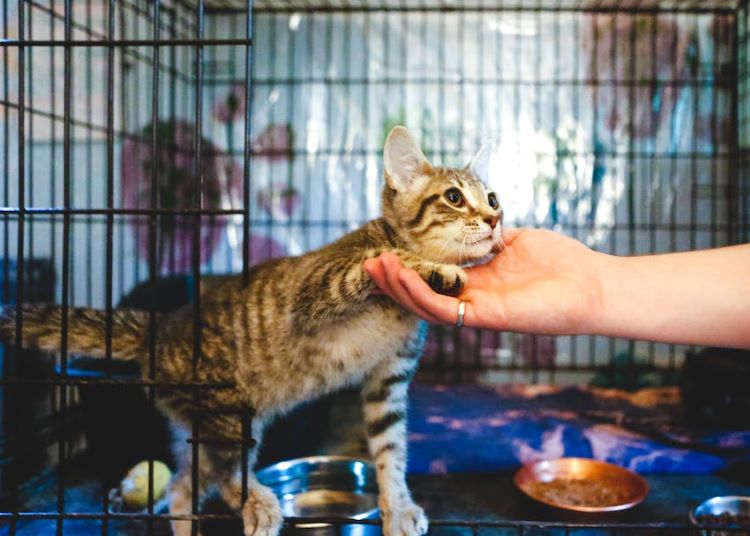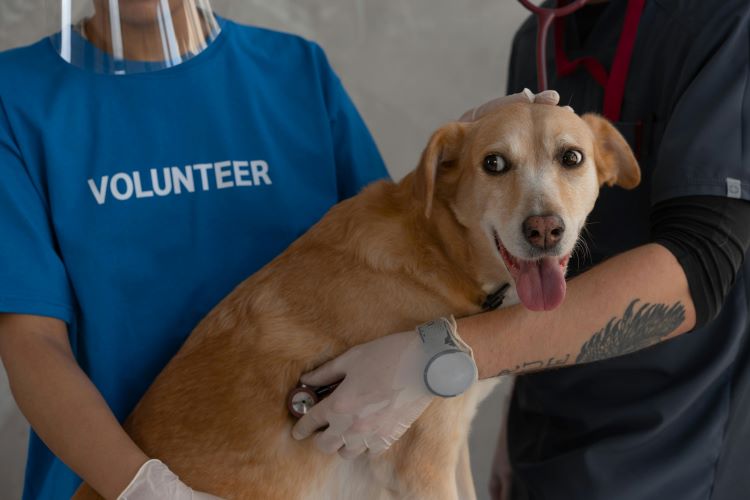Ready to help treat your pet to a healthy life?
10 Ways to Help Animal Shelters in Your Community
By : Alyssa Little & Trupanion Staff | Updated Oct 29, 2024

Animal shelters and rescues serve a vital role in modern society. From taking in animals in need to placing them in homes and running medical and educational programs, countless beloved pets are alive and well because of them. But these crucial organizations can’t do it alone. There are over 125 shelters and rescues in Canada, and the vast majority struggle every year with over-crowding and underfunding. As non-profits, shelters often have to rely heavily on support from their surrounding communities.
Interested in helping? The good news is that there are a variety of ways you can support these important and often understaffed organizations.
1. Give your local shelter a call
One of the best ways you can support your local animal shelter is to speak with their staff directly about what they need. Some organizations routinely update their websites with how people can help, but many are understaffed and do not have the time to ask for what they need, when they need it. You can also reach out by phone, email, or social media so they can answer when they have time. This is also a great way to learn about any established volunteer or foster programs they may have in the works. It's an important stepping stone in ensuring shelters and rescues get the help they actually need the most.
2. Foster
Overcrowding is a huge issue for shelters. Many try to clear space by setting up pets with foster parents, a temporary living situation that can also help dogs and cats adapt to a healthy home environment. Since the Covid pandemic, some shelters have even set up virtual training in place to help this process go more smoothly.
Fostering is a big decision and should not be done on a whim. Talk with the organization running the program about their requirements and what a foster situation might look like. Consider your home environment, schedule, and availability. But if you're up to it, chances are there’s a local dog or cat that would love to keep you company!
3. Donate supplies
Donations like towels, blankets, and dog or cat food are almost always welcome and appreciated by shelters. However, be sure to reach out beforehand (see tip #1) to see when they're accepting donations and what kinds of things they take. To keep their animals as healthy as possible, these organizations usually don't want things like old, chewed-up toys, homemade pet food, or any items that have been exposed to parasites or certain contagions. That said, most will accept the following:
- New pet food from reputable brands
- New toys (for both dogs and cats)
- Cat litter
- Clean pet blankets and bedding
- Exotic animal items — not all shelters take in pets like birds, reptiles, or rodents, but the ones that do often need extra help!
4. Monetary donations
Obviously, it's not just pet care items that help out shelters. Since so many struggle with getting the funding they need, monetary donations are important. If you’re in a good financial place and are looking for alternatives to help animal shelters, consider a monetary contribution. Empowering your local organization to fund the initiatives that are most important to them is a fantastic way to give back to these important organizations. Even a small amount can help get dogs and cats the care they need and increase their likelihood of adoption.

5. Volunteer your time
Some animal shelters and rescues are closed to the public except by appointment. However, many still require volunteers on-site to run smoothly. Volunteering at animal shelters depends on the specific needs of the organization and can change from day to day. But depending on your comfort level and experience, there may be a wide range of things you can help out with. For example, shelters and rescues need people to take dogs on walks and help teach basic training skills. Cats and kittens also need playtime and human interaction.
It's not all fun and games, of course. Shelters also need help with cleaning, administrative work, and sometimes just transporting animals around the facility. If you're flexible, any volunteer time can be helpful. This is one of the best, most direct ways you can show your animal shelter appreciation.
6. Follow your local animal shelter on social media
Even if you can’t give or donate during this time, someone in your social network may be able to help. Consider following your local animal shelter, share their social posts and make your own. Be creative in showing your animal shelter appreciation. The power of social media can truly make an impact on the animal welfare community!
Some shelters also have newsletters you can follow for more information. The shelter may not know what they need from the public yet, although once they do, they’ll be sure to broadcast their request! Consider sharing the animal shelter’s newsletter with your network. Show your animal shelter appreciation by spreading the word.
7. Learn about pet insurance
Some dogs and cats wind up in animal shelters because their owners cannot afford veterinary care. Pet insurance helps dogs and cats access essential medical care by covering a range of treatments, especially when it comes to accidents and unexpected diagnoses. It can alleviate the financial burden of unexpected vet bills, ensuring pets get timely care without owners worrying about costs. This in turn can help keep pets from winding up in shelters due to the cost of care. Promoting it while pets are still young — or newly adopted from a shelter — can help dog and cat owners protect the long-term health of their pets and get the most out of their policies.
8. Help prevent pets from ending up in shelters
Most people adopt a pet wanting to give them the best life possible. But that doesn't stop unexpected situations from getting in the way. Along with not being able to afford surprise veterinary costs, other tough economic situations can result in more pets being surrendered.
Consider checking in with your neighbors to see if they need pet supplies or just a little help here and there. Advocate for responsible pet ownership, including routine, preventive veterinary checkups, healthy lifestyles, and protecting pets early with medical insurance. We’re all in this together — helping pets with homes stay out of the shelter so that there’s more room for animals in need is another way to help your local community.
9. Promote adoption events
Volunteering your time and making donations goes a long way in helping animal shelters. However, the biggest thing most still need help with is actually getting dogs and cats adopted into loving, responsible homes. Promoting local pet adoption events and/or available animals with these organizations can help make all the difference. Just sharing the occasional social media post for a local shelter pet in need can help others you know consider adopting rather than purchasing pets. Many shelters are overcrowded, so every adopted animal helps create more room for others to find loving families. And by spreading awareness, you can help reduce homelessness, decrease euthanasia rates, and foster compassion for animals in your community.

10. Spread awareness throughout the year
Animal shelters and rescues need our help, and every bit counts. Follow your local shelter's social media pages, and subscribe to their newsletter if they have one. Doing so can help encourage others to follow suit, increasing the likelihood of adoptions and other donations.
Have a shelter adoption success story of your own? Post to your animal shelter’s page or leave a review about the impact they’ve made in your life. Spread some positivity and let others know how much they mean to you. Show your animal shelter support by sharing a personal snapshot of just how much shelters do for the communities they serve.
When is National Animal Shelter Appreciation Week?
Animal Shelter Appreciation Week, observed annually during the first full week of November, is an important time to honor the tireless work and dedication of animal shelter staff and volunteers. Established by the Humane Society of the United States, the week raises awareness about the challenges shelters face, from resource shortages to the need for volunteers. It's a time for communities to show gratitude through donations, volunteer efforts, or simply sharing supportive messages. As we've discussed here, animal shelters and animal rescue organizations provide critical services, offering animals a safe haven and the opportunity to find loving homes. This week is a chance to celebrate their invaluable contributions.
Whether you choose to foster or share your story on social media, there are many ways to give back to and show support for your local animal shelter. And if you have the chance to open up your home to a dog or cat in need, the benefits are limitless!
